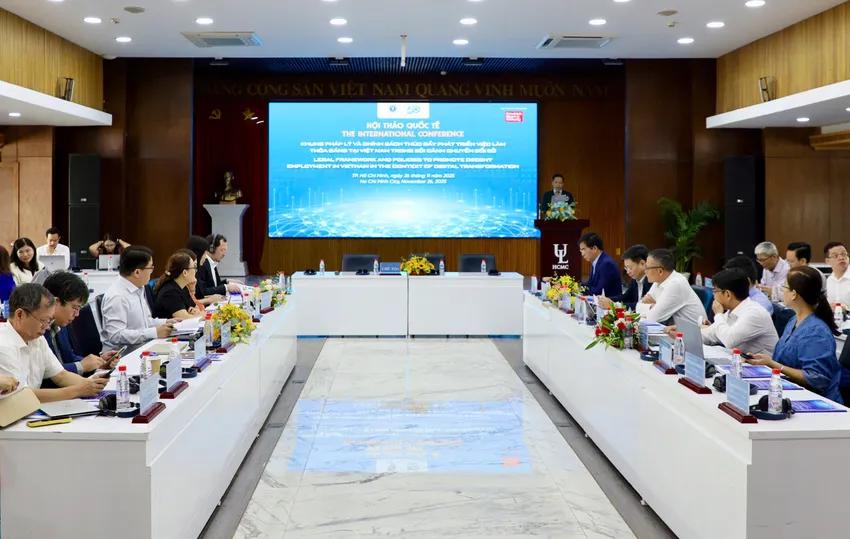On November 26, Ho Chi Minh City University of Law in collaboration with Friedrich-Ebert-Stiftung (FES) organized an international workshop on “Legal and policy frameworks for promoting decent work in the digital age”. The event brought together many experts in the fields of law, labor and digital economy to discuss how Vietnam can build a modern and sustainable labor market.

In his opening remarks, Dr. Le Truong Son, Rector of Ho Chi Minh City University of Law, emphasized that digital transformation is dramatically changing the employment structure. Therefore, it is urgent to build a new legal framework to protect workers and encourage market flexibility.
How is the legal framework for digital work understood?
According to the analysis of Associate Professor Dr. Nguyen Huu Chi (Hanoi Law University), it is a system of regulations, mechanisms and policies issued by the State to regulate relationships arising from job creation, labor management and market operations in the context of the digital technology boom. This legal framework must ensure the right to work, sustainability and adaptability of both workers and businesses.
Mr. Chi also made a series of recommendations: from perfecting the digital transformation institution to soon promulgating the Digital Transformation Law, improving state management capacity and building policies suitable for digital economic practices.
Notably, he proposed that Vietnam should pilot a controlled testing mechanism (sandbox) for salary payments in crypto assets. The reason: The Labor Code currently only allows salary payments in VND (and in some cases in USD), but in fact many technology companies in the world have used cryptocurrencies for personnel payments. The sandbox will be an opportunity to verify market reactions and perfect policies before widespread application.
Digital transformation – a wave of strong changes in the labor market
Also at the workshop, Dr. Le Thi Thuy Huong (Ho Chi Minh City University of Law) analyzed the far-reaching impact of digital transformation, especially the explosion of AI. New technology helps create many new jobs but also causes traditional jobs to be automated faster, leading to the risk of income inequality and social security.
From international experience, Dr. Huong gives three major suggestions for Vietnam:
1. Prioritize training in digital skills and soft skills , incorporate skills such as basic programming, data analysis, critical thinking, etc. into the curriculum and build a lifelong learning policy.
2. Build a flexible social security system for platform workers , with a contribution model that matches actual income and platform company participation.
3. Perfecting the legal framework on platform labor , including requirements for algorithm transparency and ensuring fairness in digital management.
The workshop opened up many new directions for the Vietnamese labor market in the digital age. Building a modern, flexible legal framework, while piloting experimental models such as paying salaries in crypto assets, not only helps protect workers’ rights but also creates conditions for technology businesses to develop. When combined with digital skills training, flexible social security and transparent digital management, Vietnam will have the opportunity to build a sustainable, fair and responsive labor market to technological change.
Source: Ho Chi Minh City Law Newspaper







